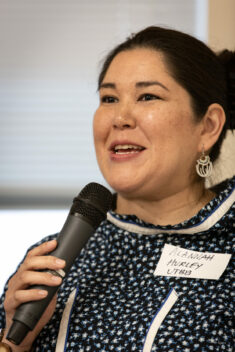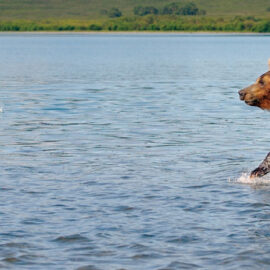Bristol Bay residents and fishermen call out shoddy mine review process during Capitol Hill hearing.
Congress heard directly from Alaskans about a Pebble Mine permitting process gone awry, during a hearing before the House Subcommittee on Water Resources and Environment today. The mine’s Clean Water Act permits are being fast-tracked at unprecedented speed, at the direction of political appointees at Army Corps and the EPA. Alaskans on Capitol Hill Wednesday were deeply distressed about the politicized process. This came just days after news reports of insider trading by stock holders of Pebble’s holding company.
Alannah Hurley, executive director of the United Tribes of Bristol Bay, reminded lawmakers that the Yup’ik, Dena’ina, and Alutiiq peoples of Bristol Bay represent some of the last remaining salmon cultures in the world – according the federal government’s own Bristol Bay analysis published in 2014.
But the limited tribal engagement from the Army Corps of Engineers, including its failure to visit the potentially impacted villages around Bristol Bay during the mine’s review, was “insulting,” Hurley said in written testimony.

“With so much at stake, the people of Bristol Bay, and all Alaskans, deserve a fair, thorough, and transparent review of the proposed Pebble mine. In contrast, the Corps’ opaque process is moving toward a permit decision at an unprecedented pace, ignoring substantial criticism and concern from Bristol Bay Tribes, other federal agencies, and the public.
“The Corps has made clear that it will not listen to our voices, so we ask this Committee to act now and help us protect Bristol Bay.
She added, before the committee: “And why is it that Bristol Bay’s first people, to whom this federal government owes a sacred trust responsibility, are continually treated as second class citizens by agencies of the United States? We are not a box to be checked. We are not an obstacle to be overcome. And we are not enemies to be defeated. We are the indigenous people of Bristol Bay & we deserve to be heard, we deserve to be respected, and we will not be brushed aside. We have inherited the responsibility to be strong stewards of Bristol Bay and we will not stop fighting until our homeland is protected from Pebble Mine.”
Oregon Congressman Peter DeFazio leveled his own critiques of the Army Corps and Pebble, which he called a “shell company.”
“Let me state, right from the start, that the Pebble Mine proposal is a bad idea made even worse by the sham review process currently underway,” DeFazio said.
“I also want to express my deep disappointment with the Corps of Engineers on their track record of review for this project to date,” DeFazio continued. “If the Corps continues its current path to rush approval of this project, I believe this will be a stain on the reputation of this proud institution, which continues to serve as our nation’s premier water resources agency.”
Bristol Bay lodge owner Brian Kraft told the committee that the region represents one of the greatest salmon landscapes left in the world.
“People spend significant amounts of money, time and effort to travel from all over the world to experience and fish in this unique, pristine and incredibly productive corner of Alaska,” Kraft said. “There are very few places left in the world where you can see and fish for thriving runs of salmon and massive rainbow trout, and fly for miles without seeing a road, buildings or other signs of human development.
“Clients who come to my lodge are blown away by the magnitude of this place, and the special, uniquely Alaskan experience that comes with it.”
That sort of place should be developed with utmost care, Kraft argued. But the permitting process led by the U.S. Army Corps of Engineers is delivering just the opposite.
“The goal of the Clean Water Act is to restore and maintain the health of the Nation’s waters. Surely the tremendous resources I have described would warrant one of the most critical, science-based reviews for a permit in the history of the law. The Corps has done just the opposite.
“The review being conducted by the Army Corps of Engineers is unacceptable. It is a mockery not worthy of the lofty goals of the Act that this Committee oversees and stewards.”
Commercial fisherman Mark Niver called the fast-tracked process a “runaway train” that threatens “my livelihood and that of my three sons.”
Niver has been fishing in Bristol Bay for over 40 years, and his sons grew up fishing with him.
“For me and many others, fishing in Bristol Bay is a family endeavor and that’s part of what makes it so special,” Niver said. “It’s also generational and you often have multiple generations fishing together. I raised my three boys on my fishing boat; they started to come out with me when they were ten years old. Commercial fishing taught them how to work hard and solve problems on their own.”
Fishing Bristol Bay is also a powerful economic driver. This summer, Niver harvested over $650,000 worth of fish, part of the $1.5 billion Bristol Bay salmon economy.
But he remains deeply concerned about Pebble Mine and the Army Corps’ unwillingness to address fishermen’s concerns about toxic waste releases from a plausible collapse of an earthen dam at Pebble’s waste storage facility.
“We have yet to see the Army Corps address our concerns and questions, including our request for a more rigorous tailings-dam failure assessment,”Niver said. “Instead, it appears that this Administration has already decided the outcome and is simply going through the motions. That’s not how a permitting process should work, especially in Bristol Bay where the world’s largest wild salmon fishery is at stake. The integrity of this permitting process has been compromised and I have no confidence that the concerns and interests of Bristol Bay’s fishermen will be factored into the Army Corps’ final permitting decision.”




